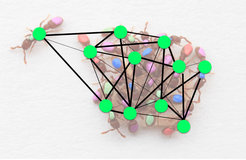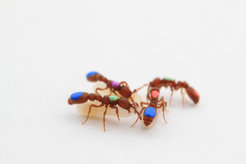Lise Meitner Research Group Social Behaviour
Slider images: Anna Schroll
What we do
We are interested in the causes and consequences of behavioral diversity and plasticity, with a particular focus on the impact of social behavior on disease spread. We seek to understand how individual traits, the social environment, and the epidemiological context shape individual and collective behavior.
Our research combines laboratory experiments with live ant colonies, computational analyses of individual and collective behavior, and molecular approaches in a new system, the clonal raider ant, whose unusual biology allows us to precisely control and replicate colony composition.
Questions
Some of the questions we are working on include:

- How does the composition of a social group affect the structure of its social network, and the speed and routes of disease transmission within that group?
- How is immune function distributed across members of a social group, and how does it affect predicted and realized disease spread?
- How does infection or immune status affect individual and collective behavior within and across generations?
- How do larvae control the behaviour and reproduction of adults? How does that affect their own development and the survival of adults?
System

Our study system, the clonal raider ant Ooceraea biroi, combines the rich social biology of ants with a high degree of experimental amenability. This species displays an unusually simple social organization: colonies have no queens, but instead consist of workers that reproduce clonally and synchronously. Synchronized brood development drives stereotypical behavioral cycles of about one month, in which colonies alternate between reproductive and foraging phases. Synchronized reproduction also means that all adults emerge in discrete cohorts. This unique biology provides experimental control over several factors that often affect behavior (age, genotype) at the individual and group levels.
Methods

We develop and use tools that allow to perform large-scale behavioral experiments (100+ colonies), and software to analyse the behavior of individually-tagged ants in each colony.
In parallel, we develop and use protocols to infect ants with various live pathogens (fungi, bacteria, nematodes) and monitor their transmission to other colony members over time.
Finally, we investigate the proximate drivers of disease-relevant social behavior using experimental manipulations of immune activity, molecular tools, and through collaborations with chemical ecologists.






